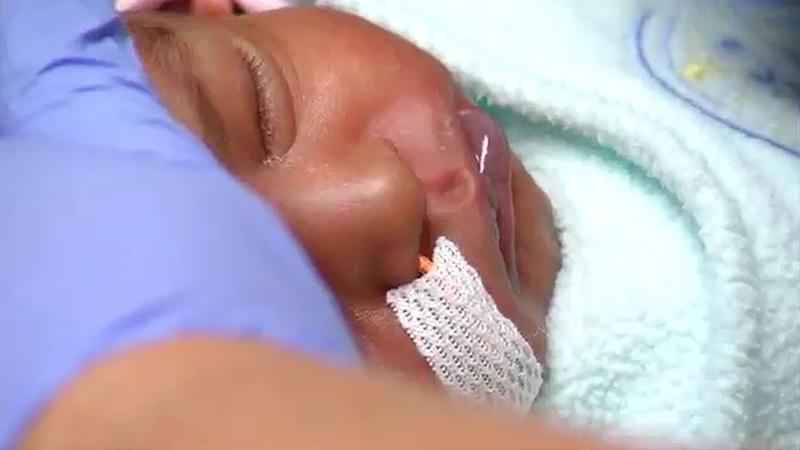Children’s Minnesota pilot program allows parents to take premature babies home sooner
[anvplayer video=”5045024″ station=”998122″]
A pilot program at Children’s Minnesota is enabling premature babies to leave the hospital more quickly. Families started enrolling in the Children’s Home App-based Monitoring Program (CHAMP) study during the summer of 2020.
Offered at the Children’s Minnesota St. Paul Neonatal Intensive Care Unit (NICU), it allows certain premature babies to go home with a feeding tube that’s monitored by doctors through an app.
Neonatologist Dr. Cristina Miller said she heard about similar programs elsewhere in the country a few years ago at a conference. She started working to implement a pilot program at Children’s Minnesota before the pandemic began.
“What I originally envisioned was that families would get home a few days faster or a week faster. It could help them not have to pay for parking, not having to make the drive,” Miller said. “Instead it ended up being that they got to go home earlier and meet their sibling or grandparent, and that was so impactful for families.”
NICU visitation was limited during the peak of the pandemic. While COVID-19 delayed the start of the study, Miller started enrolling families in the summer.

[KSTP]
Eighteen families have now participated in the study.
“We decided to focus in on healthy babies that could otherwise go home except for the fact that they need a feeding tube,” Miller said. “Once they get to that 35-week mark, at that point we know they’re strong enough. They’ve started to have those emerging feeding skills. Our speech therapists have watched their feeding and know they’re doing a good job and they just need time and patience and their parents.”
Jena and Aaron Quigley noticed immediate improvement when they brought their son Colin home from the hospital.
“He took off really quickly at home,” Jena Quigley said.
He was born prematurely at 31 weeks, spending nearly a month in the Children Minnesota St. Paul NICU. Jena and Aaron traveled back and forth between the hospital and home every day, while also finding childcare for their 3-year-old son, Weston.
“[The pandemic] was obviously an added stress just worrying about it every day. We didn’t want him to be sick or us to get anything because then we couldn’t go up there,” Jena Quigley said. “All the time we were screening anyone that was around him or coming over. That was pretty nerve-wracking for me, to make sure we didn’t get anything so we could go in [to the hospital].”
Weston was also anxious to meet his younger brother.
“He would ask sometimes when we would get home at night, ‘Did you bring the baby home?’” Aaron Quigley said. “He was super, super excited to meet him.”
The Quigleys said they were approached about participating in the CHAMP study within a few days of Colin’s birth.
“I think we were apprehensive at first,” Aaron Quigley said. “Once we got home, we were so thankful we had that opportunity to have those extra days.”
Colin was eligible to leave the hospital when he reached 35 weeks. The Quigleys were equipped with a tablet, a scale and extensive CPR and feeding tube training. Each day, they entered Colin’s weight, feedings and other information into the Locus App on the tablet, which Miller reviewed remotely.
“Every morning, we make rounds and I talk to them and talk through what the plan is for the day, if there are any concerns,” Miller said. “And 24 hours a day, if there’s a problem they can reach out to us.”
Colin’s feeding tube was quickly removed.
“He was here in the NICU and was barely taking about 25-30% of his feedings by mouth,” Miller said. “He got home, and the first day he took 80%, his second day he took 90%, by 48 hours that tube was out.”
According to Miller, CHAMP is a short-term solution.
“We anticipated before we started the study most babies would be off of the study by seven days,” she said. “Now looking back, our average so far has been three and a half days, so this has been very quick. Patients are getting home, they’re getting into that comfortable environment with their families, they have a consistent feeder and they’re flourishing.”
Twenty families will be enrolled during the first phase of the pilot program. According to Miller, there haven’t been any safety events among those currently enrolled.
“We haven’t had any patients that needed to come back to our emergency department,” she said.
Miller said once they finish the first phase, they plan to start a larger study with a control group. The next phase will enroll about 100 patients and extend to all Children’s Minnesota NICUs. If it’s successful, she hopes this will become the standard of care.
“It’s a new way of practicing medicine,” Miller said. “I think it will change the way we practice medicine, and I think going forward we’re going to see a lot more of this, doctors wanting to keep families at home and monitor them at home. I think we’re going to expand it to a lot of different populations here in the future.”
The Quigleys said they feel grateful CHAMP was an option for their family.
“The apprehension kind of went away when we got home,” Aaron Quigley said. “Because it feels good to be home and to see him meet his brother and grandparents and family members. We’ve really felt comfortable right away. … We’re really happy we did it.”